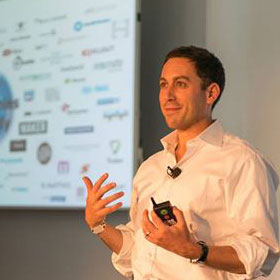The Subtext is Facebook
Posted on .The last two weeks have been incredibly busy at Greycroft – we had our annual CEO Summit at the Bacara Resort in Santa Barbara, we closed two new investments, and I was invited to go on Bloomberg television twice to discuss the IPO market (links here and here).
I have been checking the stats for these clips every few days and to date they have been watched 766 times. Sure, many of these views were from my mom, but nonetheless I am pleased that so many people tuned in. At the moment the clips have more views than John Battelle (CEO of Federated Media) and Zorik Gordon (CEO of Reach Local). However I am still 94,000 views short of Mr. T talking about his gold chains.
Anyway, while they asked me about LinkedIn and Zynga, the question that everyone is really wondering is, “If Linkedin is worth $10bn, and Zynga is worth $20bn+, then what is the value of Facebook?”
There is speculation that Facebook may be the largest IPO of all time, and even in the private markets Facebook is already one of the world’s most valuable companies. It is amazing to think about how in such a short time Facebook has become a global brand and a product that is used by 1/10th of the world’s population on a regular basis.
I had dinner recently with one of the early employees at Facebook, who pointed out that during the Super Bowl, Facebook’s traffic took a 15% dip, only to spike back up during the commercial breaks. This put it in context for me: the Superbowl audience is only a small subset of overall Facebook traffic.
I think Facebook’s ultimate market value can swing one of two ways. People may look at it like a media company, which means that the revenue potential is bounded by the $20bn spent every year on online display advertising. In that case it would be a smaller company than Apple or Microsoft. On the other hand, Facebook may be looked at as the connective tissue of the human race, the source of online identity, and the engine of a new digital economy. I don’t know how to value the second scenario, but it is a big number. And potentially it is big enough to make 27 year old Mark Zuckerberg the richest person in the world.

Ian Sigalow
http://sigalow.comIan is a co-founder and partner at Greycroft Partners in New York City. He has been a venture capitalist since 2001.
AUTHOR matthew putman
Posted on 11:37 am June 1, 2011.
This is a really profound point that you make about the second scenario valuation, and one that people may need to consider when valuing a company. i just am not convinced that Facebook is uniquely in a place to fully redefine the “tissue of connectivity”. While they are leaders, it would only make sense fully if they were a monopoly. since there is Linkedin etc, the uniqueness requires some kind of more down to earth valuation, or for the new metrics to apply to the other competitive sites relative to Facebook market share. like you say though, it seems very hard to define the valuation of such a huge sociological concept.
AUTHOR kevinjbradshaw
Posted on 5:52 am June 21, 2011.
Nice piece Ian.
“…connective tissue of the human race, the source of online identity, and the engine of a new digital economy.. “
Isn’t that email? 😉
I’m going to be stupidly ballsy and say I think Facebook is peaking and any few-days-post-exuberance-IPO price may never be exceeded. I feel that way about Pandora at the moment. It may never get above $20. It’s just a fancy radio station. I used to love it, now I hardly use it.
Pretty much everyone I know say they “hardly use” facebook, or “I just don’t have time for it”. These are people who do not work in tech or social media. They are busy folks who just need to get stuff done. Sharing baby pictures is about all they do with FB if anything. Even those who do work in tech/social seem to be turning away from it. I heard it described as a “Frankensite” the other day. Nice term. I personally find the UI quite unusable in places.
Are any of us every likely to say I “hardly use” email? It’s an important point for me because I think email has some very simple and powerful inherent social features we actually threw away when we jumped to the publish and subscribe/friend-follow models of social networks. There is a massive spectrum in between that is ripe for greater exploration.
I’m working on these ideas with http://zendit.com.
Kevin